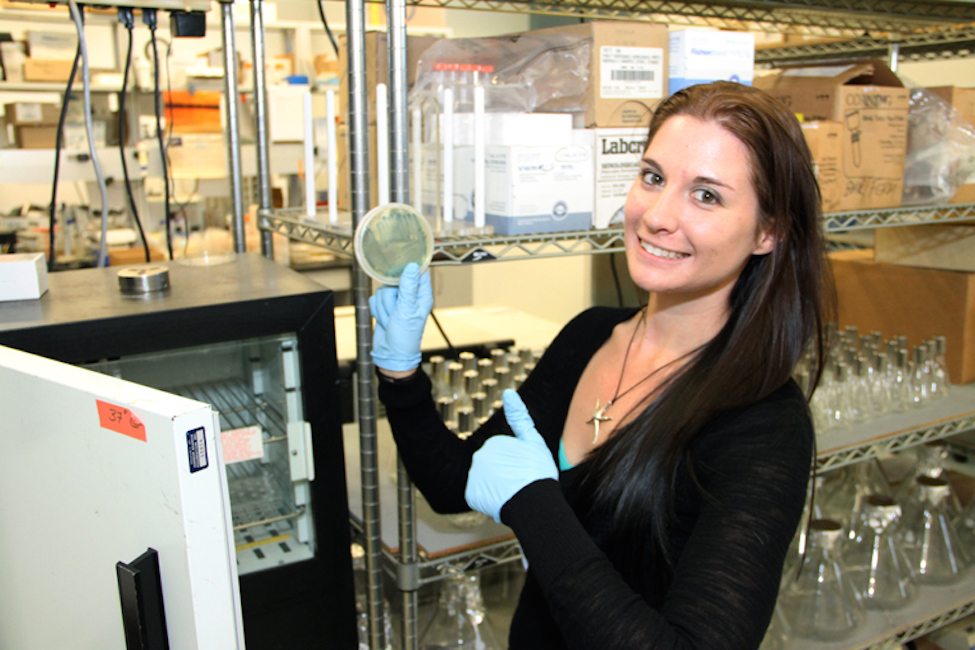FAU Graduate Studying Deadly Bacteria in Florida
Gabrielle Barbarite received her doctorate in integrative biology on Tuesday, August 9.

For Gabrielle Barbarite, the decision to attend Florida Atlantic University was an easy one. The South Florida native, 30, grew up on the water and knew she wanted to take advantage of FAU’s marine biology program. After earning an undergraduate degree at FAU, she continued her marine biology studies – determined to learn about the fatal bacteria that was infiltrating the Treasure Coast’s Indian River Lagoon (IRL) and causing much sickness and death. This important research has led Barbarite back to the commencement stage – where she recently received a doctorate in integrative biology.
Barbarite’s knowledge of FAU’s Harbor Branch Oceanographic Institute (HBOI) in Fort Pierce, a research institute focused on innovation in ocean science, originally attracted her to FAU in 2004. She immediately signed up for HBOI’s Semester-by-the-Sea program, which offers undergraduate students an opportunity to immerse themselves in marine science.
“HBOI is unique in that you can work directly with researchers who are doing these really cool projects,” she said. “It didn’t even feel like I was in school.”
After earning a bachelor’s degree in marine biology, Barbarite continued her studies at HBOI and enrolled in its graduate program in integrative biology. That’s where she connected with Peter McCarthy, Ph.D, a research professor and the associate director for education at Harbor Branch.
“Gabby and I developed an interesting Ph.D. project that combined her love of marine biology with my interests in microbiology,” McCarthy said. “She has proven herself to be a very capable research scientist whose outgoing personality allows her to communicate clearly with both scientists and the general public.”
Barbarite’s research project focused on Vibrio vulnificus, a naturally-occurring bacterium that has caused 42 deaths in Florida over the past four years, including three in the IRL where her study occurred. Barbarite has been sampling water, sediment, fish and bait to determine where these bacteria live and how they can be transmitted to humans, specifically fishermen. She says there’s a lack of information available to the public about Vibrio infections, and she’s working hard to change that.
“I want to translate the science so the public can understand it,” she said.
Barbarite collaborated with Florida Sea Grant to create a flyer about Vibrio to post at local boat ramps. She’s also been busy traveling around the state giving lectures on Vibrio at more than 20 nature centers. She’s spoken at conferences including the Indian River Lagoon Symposium, Florida Academy of Sciences, and the American Society for Microbiology. Her findings have been featured in USA Today, Florida Today, and the TC Palm.
“While I enjoy doing research, I’m more interested in education and outreach,” she said.
Barbarite says her most rewarding experience at HBOI has been working with undergraduate students interested in marine biology. She served as a teaching assistant and instructor for HBOI’s Semester by the Sea program, the same program she attended as an undergraduate.
“I worked very closely with students and helped them decide what they were interested in and how to apply for graduate school and jobs,” she said. “It’s been awesome to keep in touch with them after all these years and see all the great things they’ve accomplished.”
One of her students, Brandon McHenry, has decided to continue Barbarite’s research on Vibrio in his upcoming graduate studies. He says she has impacted his life both personally and professionally.
“Gabby has taught me skills and techniques that I could have only learned through hands-on experience,” McHenry said. “She is an incredible person, mentor and friend, and is always willing to go out of her way to help others.”
-FAU-
Tags: research | faculty and staff | alumni | harbor branch | students